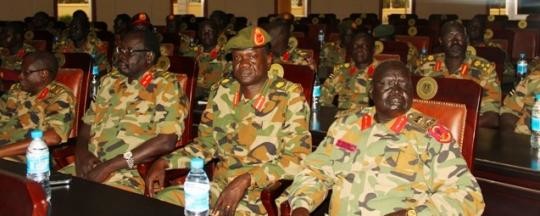Explaining S Sudan's peace deal (21): New details on Juba security arrangements

Focus on the Agreement is a new daily segment broadcast on Radio Tamazuj to explain the contents of the peace deal signed in August 2015 between South Sudan's warring parties.
In our latest broadcasts we have been looking at the economic and justice provisions of the peace agreement. Today we turn to discuss not the agreement itself but two documents signed on Tuesday in Addis Ababa about the implementation of the peace agreement.
After two weeks of negotiations the government, the armed opposition led by Riek Machar and the SPLM-G10 decided on the specific security arrangements for Juba. These details were not included in the original peace agreement.
According to the new document, the Presidential Guards in Juba will be limited to 1,000 soldiers including 650 from the existing force and 350 who will be integrated from the rebels.
Some other units will also be allowed to remain in Juba including ceremonial guards and a military band, and a logistical battalion.
The National Security Service may only keep 170 personnel in Juba. Fifty of these security personnel must be from the SPLM-IO.
The new shared unified military command will have a force of guards numbering 1320, and they will also have 500 military police, 200 of whom will be from the opposition forces.
In total there will be less than 5000 soldiers allowed to remain in Juba from all of the units. This includes 3420 from the government and 1410 from the rebels.
SPLM-IO and the government will deploy and equal number of forces to participate in the new Joint Integrated Police, 1,500 each for a total of 3,000 new joint police in Juba. They agreed also to deploy 400 police each in Bor, Malakal and Bentiu to create joint police units in those towns.
The ceasefire monitoring teams will verify the number of forces deployed in Juba to make sure it is not higher than the allowable number. All other soldiers must redeploy to other areas at least 25 km from Juba.
Prison Guards, Fire Brigade and Wildlife officers must keep their arms in the armories and should not carry them when tey are not on official duty.
These decisions were negotiated by military officers from both sides. The agreement was signed on 3 November by SPLA Maj-Gen. Marshal Stephen Babanen and SPLA-IO Lt-Gen. James Koang Chuol and SPLM Former Detainees representative Oyai Deng Ajak. The IGAD mediators witnessed the deal.
File photo